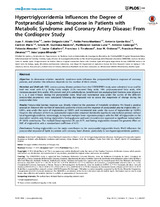Hypertriglyceridemia Influences the Degree of Postprandial Lipemic Response in Patients with Metabolic Syndrome and Coronary Artery Disease: From the Cordioprev Study
Autor
Alcalá Díaz, Juan Francisco
Delgado-Lista, Javier
Pérez-Martínez, Pablo
Quintana-Navarro, Gracia M.
Gómez-Luna, Purificación
Camargo García, A.
Almadén Peña, Yolanda
Caballero, Javier
Marín, Carmen
García-Ríos, Antonio
Tinahones, Francisco J.
Ordovas, José M.
Pérez-Jímenez, Francisco
López-Miranda, José
Editor
PLOSFecha
2014Materia
Coronary heart diseaseMetabolic disorders
Blood plasma
Cholesterol
Cardiovascular diseases
Fats
Fatty acids
Blood pressure
METS:
Mostrar el registro METSPREMIS:
Mostrar el registro PREMISMetadatos
Mostrar el registro completo del ítemResumen
Objective
To determine whether metabolic syndrome traits influence the postprandial lipemia response of coronary patients, and whether this influence depends on the number of MetS criteria.
Materials and Methods
1002 coronary artery disease patients from the CORDIOPREV study were submitted to an oral fat load test meal with 0.7 g fat/kg body weight (12% saturated fatty acids, 10% polyunsaturated fatty acids, 43% monounsaturated fatty acids), 10% protein and 25% carbohydrates. Serial blood test analyzing lipid fractions were drawn at 0, 1, 2, 3 and 4 hours during the postprandial state. Total and incremental area under the curves of the different postprandial parameters were calculated following the trapezoid rule to assess the magnitude of change during the postprandial state
Results
Postprandial lipemia response was directly related to the presence of metabolic syndrome. We found a positive association between the number of metabolic syndrome criteria and the response of postprandial plasma triglycerides (p<0.001), area under the curve of triglycerides (p<0.001) and incremental area under the curve of triglycerides (p<0.001). However, the influence of them on postprandial triglycerides remained statistically significant only in those patients without basal hypertriglyceridemia. Interestingly, in stepwise multiple linear regression analysis with the AUC of triglycerides as the dependent variable, only fasting triglycerides, fasting glucose and waist circumference appeared as significant independent (P<0.05) contributors. The multiple lineal regression (R) was 0.77, and fasting triglycerides showed the greatest effect on AUC of triglycerides with a standardized coefficient of 0.75.
Conclusions
Fasting triglycerides are the major contributors to the postprandial triglycerides levels. MetS influences the postprandial response of lipids in patients with coronary heart disease, particularly in non-hypertriglyceridemic patients.

